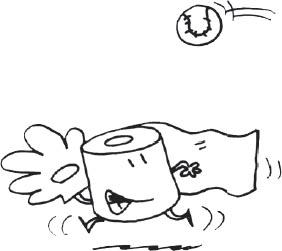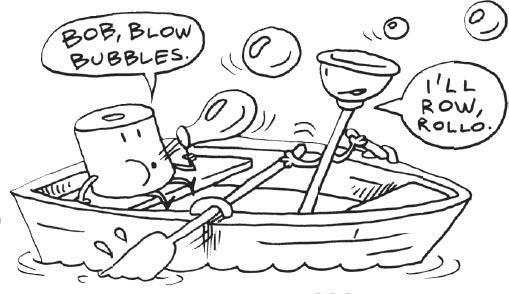Uncle John’s Did You Know? (9 page)
Read Uncle John’s Did You Know? Online
Authors: Bathroom Readers’ Institute
According to folklore, some gemstones have special powers
.
•
Agate
worn in jewelry was supposed to make other people believe you and to ward off bad dreams.
•
Lapis lazuli
could help to break down barriers, allowing people to go beyond their limitations.
•
Clear quartz crystal
was said to contain images of the future. (But few “crystal” balls at carnivals are really crystal—they’re usually made of glass.)
•
Amber
(petrified tree sap) held in the hand was believed to help people think more clearly.
•
Bloodstone
got its name because of the belief that it would stop the flow of blood from a wound.
•
Moonstones
were thought to help you understand your feelings better and act on them decisively.
•
Citrine
was supposed to make people more creative.
•
Malachite
was believed to focus the mind and make life’s changes easier.
•
Jade
is still associated with positive energy. At one time it was thought to be a healing stone that promoted charity, modesty, wisdom, serenity, and love.
•
Rose quartz
was said to encourage caring and reduce anger. It was considered a wonderful gift to present to anyone you loved.
• If you walk an extra 20 minutes every day, over a year you’ll burn off seven pounds of body fat. (Unless you’re walking to McDonald’s.)
• Scientists have determined that having guilty feelings may actually damage your immune system.
• Listening to music is good for digestion.
• Average life span during the Middle Ages: less than 30 years. We’re getting healthier: Today it’s about 65.
• Vegetarians make up about 25% of the world’s population.
• Four out of five 10-year-old American girls have already been on a diet.
• To stay healthy, the average person needs 37 grams of protein a day.
• 12% of Switzerland’s population is obese, compared to over 30% in the U.S.
• More than 40% of American women use hand moisturizer three times a day or more.
• 13% of Brits are on a diet at any given time; at least twice that many Americans are.
• One out of every 15 kids under 18 has asthma.
• Walking on hard dirt burns more calories—7% more—than walking on pavement.

• Officially, “bacteria” is plural; one bacteria is a “bacterium.”
• In 2005 Germany surpassed the United States to become the world’s number-one exporter.
• The word “one” has appeared in the titles of more than 500 movies.
• Odd fact? The ancient Greeks considered the number 1 to be both odd and even. They regarded the number 3 as the first odd number.
• The word “hiccup” appears exactly once in the works of Shakespeare.
• Only one U.S. president has had the astrological sign Gemini: George H.W. Bush.
• The first Nobel Peace Prize was awarded in 1901 to Jean Henri Dunant, founder of the Red Cross.
• One human being out of five (on the entire planet) is a Chinese farmer.
• Creepy fact: You can fit 1,815 standard-size graves into one acre of land.
• Nottingham, England, was the first city to have braille signs in its shopping malls.
• The average Haitian spends one minute per year making international phone calls.
• Iguanas can stay underwater for nearly 30 minutes.
• Crocodiles dig underground burrows in extremely hot weather…and can live in them for several months without eating or drinking.
• All reptiles are vertebrates, meaning they have a backbone. And except for snakes and a few lizards, they all have four legs.
• Snakes don’t have ears like other animals, but they have inner ears that sense ground vibrations.
• Reptiles don’t perspire, and they don’t have any sweat glands in their skin.
• The brain of a reptile accounts for less than 1% of its body mass.
• How do they pull their heads and legs inside their shells? Turtles are the only animals whose hips and shoulders are inside their rib cages.
• Some lizards have a “third eye,” a tiny, light-sensitive, transparent structure on top of the head that helps them regulate how long they stay in the sun.
• Snakes have no eyelids; transparent eye “caps” protect their eyes.
• We’ve all got one: The lowest part of your brain stem is called the “reptilian brain.” It’s the part of your brain that controls survival instincts.

How hard can it be to learn Japanese? All the kids in Japan do it. Here are a few words to get you started
.
•
Pika
means “flash of light” in Japanese, and
chu
is the squeak of a mouse. So the Pókemon name Pikachu literally means “flashing mouse squeak.”
• First-grade students in Japan are called
pika-pika ichi nen sei
, or “shiny first graders.”
• Rice is so popular in Japan that the words for breakfast, lunch, and dinner literally translate as “morning rice,” “noon rice,” and “evening rice.”
• Some Japanese animal sounds: Pig:
buu-buu
. Dog:
wan-wan
. Frog:
kero-kero
. Rooster:
ko ke kokkou
.
• In Japanese,
kara
means “empty.” So
karate
means “empty hand” (no weapon) and
karaoke
means “empty orchestra” (no voice).
• The Japanese love to shorten phrases, especially foreign ones. “Remote control” is
rimokon
(pronounced ree-mo-cone). “Schwarzenegger” is
Shuwa-chan
. And “Brad Pitt” is
Burapi
(that seems longer, but the Japanese pronunciation of his full name has five syllables).
• The Japanese word for “meow” is
nyan-nyan
. So the catlike Pókemon, Meowth, is called Nyasu in Japan.
• We say “two peas in a pod” to describe two nearly identical things. In Japanese, it’s “two cucumbers.”
• “Mets” is short for “Metropolitans,” taken from the team’s corporate name, The New York Metropolitan Baseball Club, Inc.
• Not so “innocent,” after all: The Pittsburgh Pirates were called the Innocents until 1891, when the team “stole” second baseman Lou Bierbauer from the Philadelphia Athletics. Bierbauer’s former fans started calling the team the Pirates, and it stuck.
• In the 1890s, Cleveland’s team was called the Spiders. One of their players, Louis Sockalexis, was a Native American, so fans started calling the team the “Indians.” The name was officially changed in 1913.
• At first the Astros were called the Colt .45s, but when Houston got its new NASA Space Center in 1965, Astros seemed more appropriate.
• The Minnesota Twins are named after the “twin cities” of Minneapolis and St. Paul.
• If you know anything about Milwaukee, you’ll know it’s home to lots of beer breweries; the Milwaukee Brewers seemed like a natural choice.

The kind you have to say free times thast…tree thimes… Oh, you know what we mean
.
• Sixish
• Truly rural.
• Greek grapes.
• Peggy Babcock.
• Flash message!
• Knapsack straps.
• Three free throws.
• Thieves seize skis.
• Fat frogs flying past.
• The sixth sick sheik’s sixth sheep’s sick.
• Betty better butter Brad’s bread.
• Mrs. Smith’s Fish Sauce Shop.
• Toy boat. Toy boat. Toy boat.
• Moose noshing much mush.
• Girl gargoyle, guy gargoyle.
• The epitome of femininity.
• The myth of Miss Muffet.
• Freshly fried flying fish.

• How many police officers are there in the United States? About 561,000.
• The most: New York City has more than 30,000 officers.
• The rest: 90% of the nation’s police departments have fewer than 25 officers.
• The FBI has more than 200,000,000 fingerprints on file.
• 70% of all violent crimes are committed by only 6% of the criminal population.
• The results of a lie-detector test are not allowed as evidence in most U.S. courts.
• Shoplifters in the United States pocket $35 million worth of merchandise every day.
• In a police lineup, the suspects are numbered 2 through 9; no one wears the number 1. Why? So no one person looks any guiltier than the others.
• Thefts from vending machines cost the soft-drink industry $100 million a year.
• Out of every six robberies, one involves a robber who knows the victim.
• Most burglaries occur during the daytime.
• In Finland, a man once got a $200,000 speeding ticket. Why? Because in Finland, traffic fines are based on the income of the offender…and the speeder’s family was extremely rich. (They owned a sausage company.)
• In 1985, a woman was accused of stealing a basketball. It turned out that she was pregnant.
• The most common excuse drivers give police officers after they’re caught speeding: “I didn’t see the sign.”
• Have you heard the term “M.O.” on a cop show? It stands for
modus operandi
, which is Latin for “method of operating.”
• Forensic fact: Police have a special type of wax that can lift a shoe print from snow.
• 53% of people polled believe the police are good at catching criminals.
• Middle children are less likely to end up in prison than first- and last-born children.
• Pink in the clink: There’s a color called “Jailhouse Pink” that’s been proven to soothe angry prisoners—but it only works for about half an hour.
• In 2004 a woman was arrested for trying to pass a $1 million bill at a Wal-Mart in Georgia. (It was fake—there’s no such thing as a $1 million bill.)
• A police sergeant in Texas was fired for taking a soda from the refrigerator in a house he was searching.